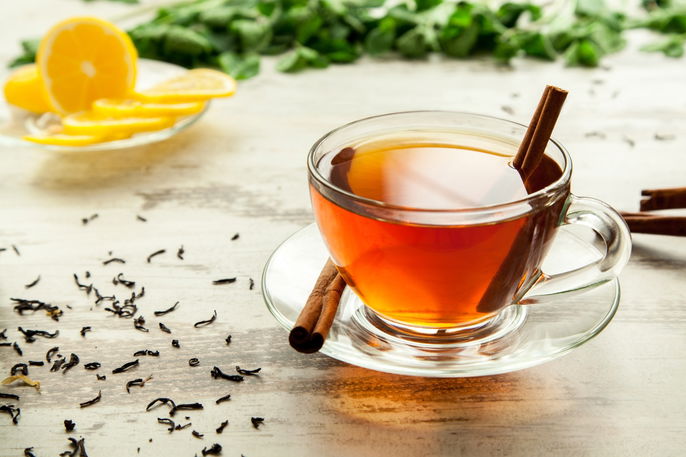Cinnamon tea has antioxidant and thermogenic properties, and can therefore strengthen the immune system, prevent premature aging and promote weight loss.
Cinnamon tea also has analgesic, bactericidal and anti-inflammatory properties, which can help to relieve menstrual cramps, prevent tooth decay and treat gingivitis.
This tea can be prepared with cinnamon powder or cinnamon sticks. Cinnamon sticks will typically contain more essential oils and beneficial properties.

Health benefits
The main health benefits of cinnamon tea are:
1. Promoting weight loss
Cinnamon tea contains large amounts of cinnamaldehyde, a bioactive compound with thermogenic activity that speeds up metabolism. It stimulates fat burning and can contribute to weight loss.
2. Relieving menstrual cramps
Because it contains eugenol and linalool, which are bioactive compounds with analgesic properties, cinnamon tea can help relieve cramps during menstruation.
It also helps to reduce other period symptoms, such as nausea and vomiting. Learn more about other common period symptoms that can occur.
3. Preventing premature aging
Cinnamon tea helps prevent premature aging because it is rich in antioxidant compounds that protect the skin from damage caused by free radicals. It can prevent sagging and the appearance of wrinkles.
4. Maintaining oral health
Cinnamaldehyde, linalool and eugenol are compounds present in cinnamon tea that have a bactericidal action. These can maintain oral health and help to combat bad breath, plaque and gingivitis.
5. Managing diabetes
Some studies indicate that cinnamon tea can help control diabetes, as this drink can improve how insulin works to keep blood sugar levels normal.
Cinnamon tea can also inhibit some digestive enzymes, and slow down the digestion of carbohydrates to prevent a rapid rise in blood glucose levels.
However, more studies are needed to confirm the benefits of cinnamon tea in controlling diabetes.
6. Strengthening the immune system
Because it has anti-inflammatory and immunomodulatory properties, cinnamon tea helps to strengthen the immune system to fight viruses, bacteria and fungi. It can be taken to treat colds and flu.
7. Improving libido
Because it has stimulating properties and improves blood circulation, cinnamon tea can increase genital sensitivity, which can improve libido and pleasure.
8. Preventing cardiovascular disease
Cinnamon tea contains hesperidin and coumarin, which are bioactive compounds with antioxidant and anti-inflammatory properties. These help to improve blood circulation and prevent the formation of blood clots, thus preventing cardiovascular diseases like thrombosis and heart attacks.
In addition, cinnamon tea also promotes blood vessel dilation and can therefore help prevent and treat high blood pressure. However, more studies are needed to confirm the benefits of cinnamon tea on high blood pressure.
Does cinnamon tea regulate menstruation?
Although cinnamon tea is popularly used to regulate menstruation, there is still no scientific evidence to confirm the effect of this spice in stimulating menstruation. Read more about whether cinnamon can induce a late period.
How to make
To make cinnamon tea, place 1 g of cinnamon stick and 200 ml of water in a pot and bring to the boil for 10 minutes. Then remove the cinnamon stick and drink. You can drink up to four cups of this tea a day, preferably with meals.
Cinnamon tea can also be made with powdered cinnamon, however, the cinnamon stick is the preferred form as it contains more essential oils and beneficial properties.
Possible side effects
Drinking up to four cups of cinnamon tea a day is generally considered safe. It is safe to use for up to six weeks.
However, ingesting high amounts of cinnamon tea can cause mouth and lip irritation, sweating, runny nose, hypoglycemia, liver intoxication, increased heartbeat and respiratory rate.
Side effects are most associated with cinnamon tea prepared with large quantities of Cinnamomum cassia, as it contains a high content of coumarins. This substance can cause allergies, skin irritation, hypoglycemia and liver damage in people who have serious liver diseases.
Contraindications for use
Cinnamon tea should not be consumed by pregnant or breastfeeding women. It is also contraindicated for children, people with ulcers, gastritis or severe liver disease.
People who use antibiotics, anticoagulants, diabetes medication or heart problems should talk to their doctor before drinking cinnamon tea.






























